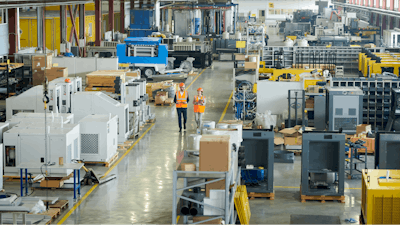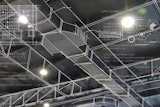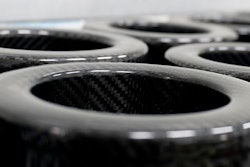
A proposed industrial development called River Pointe Commerce Park is looking to attract manufacturers to the Lehigh Valley region in Pennsylvania.
Lou Pektor, the project's developer and president of real estate development company Ashley Development Corp., emphasized manufacturing over warehousing in the park's vision and foresees a wide range of occupants, including chip manufacturers, data centers, sustainable plastic recyclers and vertical farming operators. The project is expected to create approximately 4,000 manufacturing jobs, according to Pektor.
Pektor recently elaborated on the plans and concerns regarding River Pointe Commerce Park in an interview with Manufacturing.net. Responses have been edited for length and clarity.
Nolan Beilstein: Why is it important to bring manufacturers to this area?
Lou Pektor: River Pointe Commerce Park has been developed to attract world-class international manufacturers, serving as a model for industrial campuses and a catalyst for rebuilding America's manufacturing infrastructure and global competitiveness.
Located in Upper Mount Bethel, Pennsylvania, River Pointe Commerce Park can reach one-third of U.S. consumers within a one-day drive and has accessibility to major transportation routes, international airports and prominent ports.
River Pointe Commerce Park spans over 800 acres with 13 proposed buildings totaling over 5 million square feet. In addition to new construction, the project’s scope includes demolishing and remediating a former coal power plant that has polluted Pennsylvania and New Jersey for decades. The park will also generate over 4,000 good-paying manufacturing jobs and create a source of tax revenue for the region. In recent years, the Lehigh Valley region has demonstrated robust growth in manufacturing, now constituting nearly 20% of its GDP.
This area has historically seen the extinction of its textile and industry, and the project site is in a township where 84% of the land will never see development. It provides immense local tax stability and economic self-reliance that the township would otherwise not have.
NB: What types of manufacturing companies would be an ideal fit for the area?
LP: River Pointe Commerce Park's future development envisions a dynamic ecosystem that accommodates a variety of manufacturing industries. The park is situated adjacent to an existing industrial park, and its strategic location near major transportation routes, including I-80, and the ports of New Jersey, New York and Philadelphia positions it favorably for chip manufacturing, advanced recycling and other industries requiring specialized infrastructure.
As the project progresses, it would be ideal to have users that are synergistic, creating an eco-industrial park. For example, the area could be home to an aluminum can manufacturer and a beverage producer. This would decrease the need to transport materials in and out and would allow users to build relationships and decrease logistics costs.
NB: What kind of companies have committed to establishing operations at the proposed park?
LP: As with any other industrial projects, NDA’s limit our ability to disclose details. So, while specific names cannot be disclosed at this stage, River Pointe Commerce Park is engaged in discussions with potential tenants across various industries.
NB: How are you enticing manufacturers to the area? Are any local or state tax benefits available?
LP: The park's infrastructure is tailored to meet the specific needs of modern manufacturers, featuring ample power, high pressure gas and water capacity; excellent transportation access with rail lines running through a portion of the site; and flexible building specifications that cater to various production processes.
Notably, the site is approved to develop buildings ranging from 40,000 to 1 million square feet and building heights of up to 100 feet, which provides a distinct advantage to specialized industries, particularly those in the food sector that require vertical mobility for storage and processing.
Moreover, the project offers attractive tax incentives, including a 10-year phased-in real estate tax plan known as Local Economic Revitalization Tax Assistance (LERTA).
There are also numerous incentives and funding opportunities through the Commonwealth, as well as federal programs geared for this type of project. Manufacturers can also benefit from various programs through the Interagency Working Group on Coal & Power Plant Communities including Energy Community Tax Credits.
NB: What is the reasoning behind shifting from warehousing to manufacturing?
LP: Warehouses tend to be more generic in design and typically house multiple companies for a short period of time.
With manufacturing, the user’s longevity is different. They invest substantial capital into the fit and finish of the interior of their buildings. They are putting their own equipment inside and customizing their footprint, which means they are there to stay.
NB: Does the area have the workforce and talent to support new manufacturing jobs?
LP: The Lehigh Valley has an existing skilled labor pool and strong workforce development opportunities, a growing young population and great colleges that are proximate to the project including Lehigh University, Lafayette College, Penn State University, among others, with established programs and partnerships to create business-specific tailored workforce development programs.
NB: How have you addressed concerns of increased traffic and environmental impact?
LP: The developer has been working directly with Upper Mount Bethel Township, PennDOT and Norfolk Southern, all of whom have been supportive of the objective. River Pointe Commerce Park users will be accessing I-80 directly, which is 1.5 non-residential miles away, along with freight service on the adjacent Norfolk Southern Secondary line.
The industrial park itself has been designed intentionally to eliminate the need to access township residential neighborhoods and roads; River Pointe Commerce Park will have a singular trunk road that has multiple emergency access points, but has been intentionally designed to direct I-80 incoming and outgoing traffic to the park and away from residential areas of town.
The park is also using other creative ways of reducing vehicle movements during the project's construction, including an already planted 2,200-tree onsite nursery to eliminate the movement of mature trees to the site. The developer is also evaluating additional methods of reducing traffic during buildout by using onsite resources to minimize truck traffic during construction.
As part of the park's master plan, the developer will create a public environmental education center; five miles of publicly accessible walking trails, which are located near National Park trail heads; and 50 acres of preserved woodlands.























